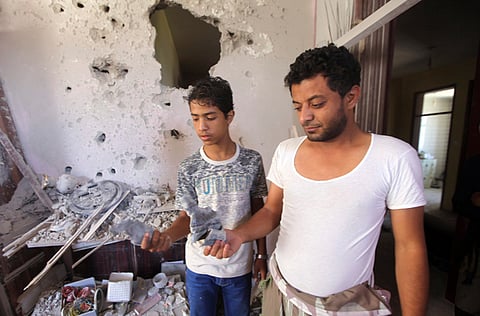Iran supported Al Houthis’ Sana’a takeover — intelligence chief
Official denies reports of Iranian Revolutionary Guards being freed from jails

Sana’a: Yemen has reiterated accusations that Iran is supporting Al Houthi rebels who recently took control of many strategic government and military locations in the capital.
General Ali Al Ahmadi, the director of the National Security intelligence body, said that the country had compelling evidence about Iranian military involvement in Yemen, especially in the recent Al Houthi incursions in Sana’a.
“Yemen has cogent evidence about Iran’s support to Al Houthis,” he said in an interview with the Saudi Okaz daily on Sunday.
Al Houthis have taken control of the ministry of defence, Sana’a airport and some military bases, but have failed to seize the National Security building.
“Al Houthis launched an attack on my house when they failed to control the National Security Building,” Al Ahmadi said.
He denied media reports about freeing some Iranian sailors or members of the Revolutionary Guards from Yemen prisons, saying that the country released two Lebanese military experts linked to Hezbollah who were arrested in Hodeida and Sana’a two years ago. The two experts had been visiting the Al Houthi-controlled Saada province. The official said that the release came in response to a four-month long mediation effort by Oman.
Explanation
In another earlier interview with a Kuwaiti newspaper, the same intelligence official unveiled some information about reasons that led to the fall of the Yemeni capital.
Explaining the unexpected collapse of some army regiments in the face of Al Houthis, Al Ahmadi told Al Seyasyah daily that Yemen’s army has experienced treason and penetration by Al Houthis.
“The beginning [of Al Houthi penetration into the army] was in Amran [province] when some army units failed to reinforce Brigade 310 and surrendered to Al Houthis on their way to Amran,”
The northern province of Amran has been under Al Houthi control since July 7 when they defeated rival Islamist groups backed by an army brigade. The province has long been seen as the stronghold of the powerful Al Ahmar family.
Al Ahmadi said that even the elite Special Operation forces handed over modern weapons to Al Houthis before reaching Amran.
In the capital, Al Ahmadi said that some army units embraced the wide-spread notion that the bloody conformations in northern Yemen is between Al Houthis and the Islamist Islah party, and that the army should remain neutral.
“This propaganda drove many units into refusing to execute orders of ministry of defence [to fight Al Houthis],”
Al Ahmadi said that some army brigades remain untouched despite Al Houthis’ capture of the capital, including brigades of the elite Reserve Forces and Presidential Protective Forces.
In addition to the Iranian military and material support, Al Ahmadi attributed the quick rise of Al Houthis to their ability to cash in on people’s anger over the unpopular fuel subsidies and cooperate with opponents of Islah party and the Al Ahmars.
“There are also some people who have a grudge against the government and the Islah party in particular,”
He predicted the Al Qaida militants, who vowed to fight Al Houthis, will launch attacks on the army and Al Houthis alike.
“Al Qaida target everybody. I expect that the organisation will carry out terrorist attacks on either Al Houthis or the army and security services.”
Al Houthi rebels massed supporters in the Yemeni capital on August 18 to call for resignation of government, re-introduction of fuel prices decision and implementation of the recommendations of the National Dialogue Conference.
Violence intensified on September 7 when government forces tried to disperse thousands of Al Houthis who were blocking the main road to the airport. A couple of days later, at least seven Al Houthis were shot dead by police as they were marching towards the cabinet building.
Al Houthis went on their rallies despite the Yemen president pledge to name a new prime minister and review government’s controversial economic policies. On September 21, the armed Al Houthis defeated forces loyal to Ali Mohsen Al Ahmar, a powerful Sunni army general, who fled to unknown place.
Sign up for the Daily Briefing
Get the latest news and updates straight to your inbox


